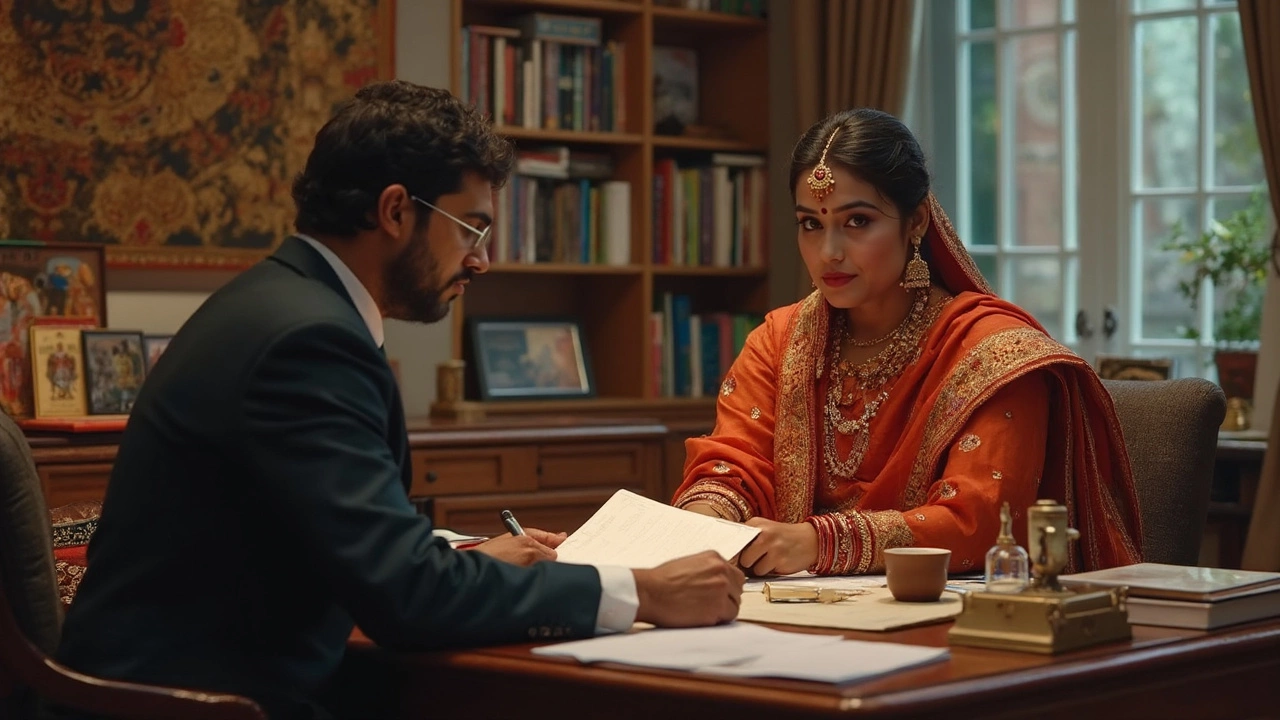You've probably heard about divorces turning into messy battles over who gets what. In India, like in many places, divorce and property go hand in hand. But can you untangle your life from your partner's without splitting assets? It's a tricky question with no one-size-fits-all answer, but let's break down what you need to know.
First off, Indian laws don't specifically use the term "community property," which you might be familiar with from places like the U.S. Instead, they lean on something called the "separation of property" rule. Basically, this means that whatever's in your name, stays in your pocket after a divorce. But before you sigh with relief, it's not always that simple. Joint assets or anything acquired during the marriage can complicate things.
- Understanding Asset Division in India
- Legal Loopholes and Conditions
- Alternatives to Asset Splitting
- Expert Tips for Protecting Your Assets
Understanding Asset Division in India
In India, the way divorce affects asset division isn't as straightforward as it might be elsewhere. The country's diverse culture and religious influences mean different rules can apply based on personal laws. For instance, Hindus, Muslims, Christians, and other communities may follow distinct regulations when it comes to splitting assets during a divorce.
Generally, India doesn't automatically divide assets acquired during the marriage. This is where the "separation of property" principle kicks in. Thus, assets directly owned by a person typically remain theirs post-divorce. However, anything that is jointly owned or bought while married might require negotiating or legal action to decide who gets what.
For those married under the Hindu Marriage Act, the court often views the contribution of each spouse towards the acquisition of the assets. If you can show you contributed more significantly to buying a home, for example, you might have a stronger claim to it.
It's also important to know that individual debt and liabilities can impact the division. If one spouse has significant debts, it might complicate how assets are split. Hiring a smart divorce lawyer can certainly help navigate these choppy waters.
Oh, and here's a handy tip: If you're contemplating a divorce and have assets you wish to protect, it might be wise to gather all financial records early. This way, if things do get complicated, you'll be prepared with documentation to support your claims.
Legal Loopholes and Conditions
So, can you wiggle out of asset splitting in divorce India? Well, there are a few peculiarities in the Indian legal system that might be worth knowing, especially if you're trying to keep what's yours, well, yours.
First off, the personal laws of your community matter—a lot! India doesn’t have a one-size-fits-all divorce law; it varies based on religion. For instance, Hindus, Sikhs, Buddhists, and Jains usually follow the Hindu Marriage Act, while Christians and Muslims follow their respective religious laws. Each of these can have different implications for asset division.
One loophole some people try to use involves debts. You see, debts are often seen as personal, not marital. If your assets are tied up in loans or mortgages solely in your name, you might argue that these are personal liabilities, and your ex doesn’t need to sink their teeth into those. But this is a risky play, and might not always work—courts can see right through it if you’re not careful.
Pre-nups, anyone? They're not super popular in India, but guess what—they're becoming more of a thing. If you and your spouse had the foresight to sign one, you're in luck. A well-drafted prenuptial agreement can be a solid fallback to protect your assets, even if they aren’t always foolproof under Indian law.
Keep in mind that a court can order alimony instead of dividing assets, especially if one spouse needs financial support. This avoids splitting property but still means you’re parting with money over time. Plus, living arrangements post-divorce can impact decisions—if kids are involved, the parent with custody might be favored in terms of home ownership.
Understanding these loopholes in asset division is crucial. You might need a smart divorce lawyer to navigate through them. It’s one thing knowing the rules; it’s another playing the game the right way.

Alternatives to Asset Splitting
Not thrilled about the idea of splitting your hard-earned assets during a divorce in India? You're not alone. While traditional asset division might seem like the default route, there are alternatives that can protect what you’ve built. Let’s explore some pathways you might consider.
One of the key ways to avoid splitting assets is setting up a prenuptial agreement. Yep, I know, nobody likes thinking about divorce when they’re planning a wedding. However, a prenup can define ownership of assets from the start, providing a clear framework that might keep you out of the asset-splitting chaos.
But what if you’re already married and didn’t think to get that prenup? Enter postnuptial agreements. Think of these as the prenup’s more mature sibling, crafted after the ‘I do’s’. They can outline terms similar to a prenup and might save both money and heartbreak.
Another strategy familiar with savvy planners is setting up a trust. By moving assets into a trust, you might keep them out of reach during divorce proceedings. This route can be complex though, and a good lawyer is vital to navigate potential legal hiccups.
Now, if you share business assets with your spouse, a clear employment contract with defined roles and ownership stakes can be a lifesaver. This document can clarify what's business versus what's marital, helping separate the personal from professional.
Sometimes, parties decide to swap assets instead of splitting them. For example, one spouse might keep the family home while the other takes the car and a larger share of liquid assets.
Of course, these alternatives require mutual consent and, at times, a bit of compromise. Consulting with an experienced divorce lawyer is a good step to see what might work best in your situation. Just like a game of chess, a good strategy involves knowing the rules and planning a few moves ahead!
Expert Tips for Protecting Your Assets
A divorce can feel like a whirlwind, and the last thing you want is to lose more than you bargained for. If you're set on keeping what's yours, here's how to navigate the tricky waters of asset division in India smartly.
First things first, always keep thorough records. Think of it as creating a paper trail that tells the story of your assets. Bank statements, purchase receipts, and property deeds are your best friends here. If you can prove ownership, you're already tackling one big hurdle.
Next up, separate your assets from day one. Mixing personal and joint accounts makes things murky later on. Open an individual bank account for your personal finances, and keep personal expenses from spilling over into joint accounts.
Consider setting up a trust. Not just the stuff of the ultra-wealthy, trusts allow you to legally shield assets from being split. It requires a bit of planning but can be a lifesaver.
If you own any businesses, treat them like a fortress. Keep clear distinctions between personal wealth and business finances. Proper documentation of financial transactions can go a long way in protecting your stake in the business.
Sometimes, trying to maneuver this on your own can feel overwhelming. Hiring a good divorce lawyer who knows their way around Indian laws is crucial. Look for experienced ones who have a knack for asset protection strategies.
- Regularly update your financial statements: Keep this practice up even when not thinking about divorce. It helps maintain a clear snapshot of your finances.
- Read through prenuptial or postnuptial agreements: These can significantly impact asset division, so understanding their terms is beneficial.
- Explore mediation or collaborative divorce: Not only does this keep things civil, but it often results in more satisfactory asset arrangements for both parties.
Finally, it might help to know that according to some recent cases, Indian courts do consider the contribution of each spouse when splitting joint assets. So make sure your contributions are well documented. It's a safeguard to ensure what you've built isn't swiftly taken away.
